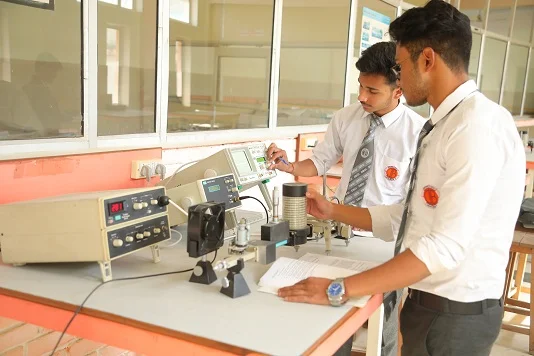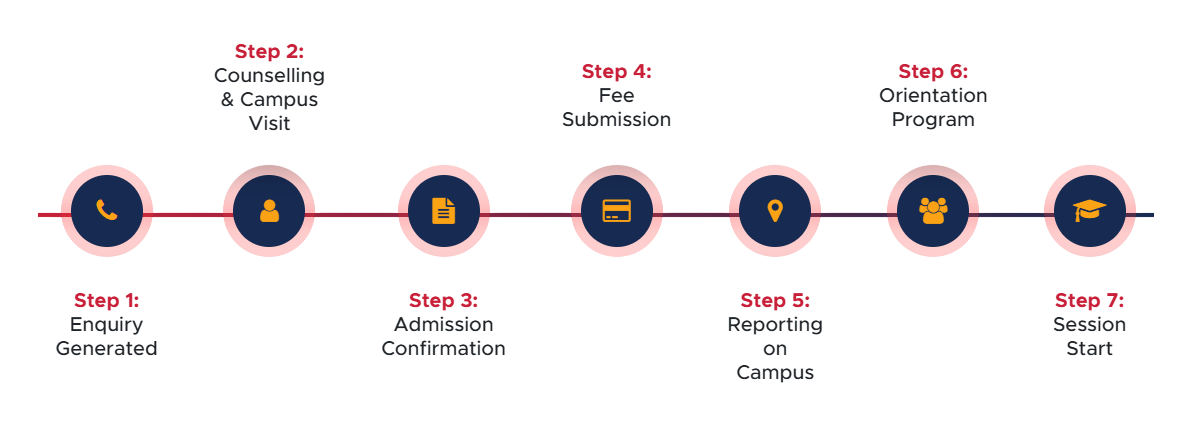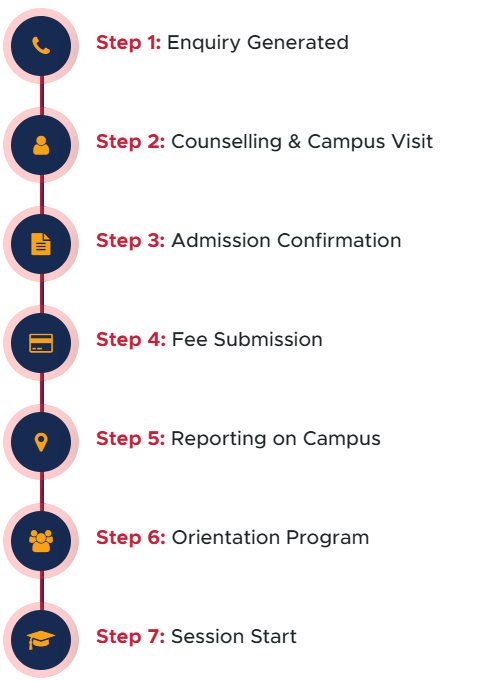Diploma in Electrical Engineering
(UBTER Affiliated)

Diploma in Electrical Engineering is a division of Engineering that examines the production and uses of electric power, its generation and distribution, and the control of machines. Designed as a skill-enabling program, it focuses on basic Electrical & Electronic Engineering principles with hands-on experiences in the basics to higher-order skills. The program deals with Electronic Circuit Analysis, Control Systems, Power Electronics, Electrical Machines, Electric Power Systems, and Telecommunications.
This program provides in-depth knowledge and understanding about various digital and analogue modulation methods utilized for communication, equipment, and methods included in wireless communications, satellite, and optical transmission technologies, etc.
This electrical diploma course aims to groom students into industry-ready individuals. The distinctive academic curriculum of this programme, apart from the theoretical knowledge, helps students develop the ability to apply the knowledge in significant organizations of the public and private sector such as Electricity Boards, Large Scale Industries, Manufacturing Plants, Power Corporations, Hydro-Electricity, Electricity Boards, Large Scale Industries, Manufacturing Plants, Power Corporations, and Hydro-Electricity, etc.
Salient Features
- 21+ years of experience
- Focus on student-centred learning
- Problem-based learning
- Industry involvement in curriculum development & training
- Best placement opportunities to get placed in high-end and reputed companies
- Industrial training in reputable firms and organizations
- The privilege of 100% placement guidance and support
- Industry visits, seminars, workshops, and guest lectures by eminent researchers and industry practitioners
- Active student clubs and bodies
- The multi-cultural and vibrant teaching environment
Admissions Open 2026!!
Merit-based admission process with online application at Dev Bhoomi Uttarakhand University.
Eligibility & Fee Details
Duration & Eligibility
3 Years
The candidate must have passed 10th examination or equivalent with 35% marks or equivalent Grade Point Average (GPA) from a recognized board can apply for admission.
Fee Structure |
|
| Particulars | Academic fee ( Per Sem) |
| All India Quota | ₹ 25000/- |
| Uttarakhand Quota | ₹ 21125/- |
| All India Quota (Lateral Entry) | ₹ 25000/- |
| Uttarakhand Quota(Lateral Entry) | ₹ 21125/- |
** Uttarakhand Quota fee is applicable only after Uttarakhand Domicile submission (upto 25%) Subject to document verification & eligibility criteria.
Duration & Eligibility(Lateral Entry)
2 Years
Candidate must have Passed 12th examination with PCM or I.T.I. Diploma
Hostel Fee & Details
View More Details
One Time Fee |
|||||
| Registration fees (Non-Refundable) | Admission Fee (Non-Refundable) | University Enrollment Fee (Non-Refundable) | Uniform Fee | Alumni Fee | Total |
| ₹ 1,500 | ₹ 7,000 | NA | ₹ 9,900 | ₹ 2,000 | ₹ 20,400 |
** In case of direct admission, the registration fee (₹ 1,500) will be waived off.
Other Fee (Per Semester) |
|||||
| Affiliation FEE (per year) Even Sem | Exam Fee | Student Welfare and Fest | Library Fee | ERP Fee | Total |
| ₹ 500 | ₹ 2,030 | ₹ 2,000 | ₹ 750 | ₹ 750 | ₹ 6,230 |
Download Fee Structure |
Click Here | ||||
Download Fee Structure(Lateral Entry) |
Click Here | ||||
Scholarship
- Upto 100% Merit Based Scholarship based on DBUU-CET2026.
Apply Now - Upto 5% Additional Scholarship For Girls, Sports & Defence Candidates.
- Upto 10% Early Bird Scholarship for admission & fee submission before 25th May 2026.
Program Specific Objectives (PSO's)
| PSO-1 | To make students into technically equipped engineers to decipher complicated problems and use comprehended skills in engineering careers |
| PSO-2 | To equip the students with the understanding of theory, training, and design of core areas of EE to devise & sustain modern electrical equipment and to partake in application-based research and development vigorously |
| PSO-3 | To train and encourage the students to evolve into future researchers with creative concepts for sustainable development |
| PSO-4 | To qualify the students to successfully contribute to diverse industrial and government organizations both at the national and international levels |
Program Educational Objectives (PEO's)
| PEO-1 | To provide the students with an understanding of the theory and strategy of core areas of electrical engineering to generate & troubleshoot modern electrical equipment |
| PEO-2 | To acquire proficient talents that equip them for rapid employment and life-long knowledge in developed areas of computer science and corresponding fields |
| PEO-3 | To establish their ability to acclimate to a rapidly altering environment by understanding and devoting new aptitudes and new technologies |
| PEO-4 | To provide students with an educational foundation that equips them for excellence, leadership roles along various employment paths with motivation to proficient ethics, and vigorous participation required for a thriving career |
Programme Journey


Job Opportunities The Course Might Lead To
A Diploma in Electrical Engineering graduate has varied career opportunities. One can opt to join public sector organizations such as the Indian Army, Navy, Air Force, Railways, GAIL, DRDO, BHEL, ONGC, NTPC & so on as well as private companies in Automation and Electrical Firms such as BSES, L & T, TATA Power, Siemens, etc.

FAQ'S
What is a Diploma in Electrical Engineering?
What are the eligibility criteria for a Diploma in Electrical Engineering?
What is the duration of the course?
What are the career opportunities after a Diploma in Electrical Engineering?
Graduates can work as:
